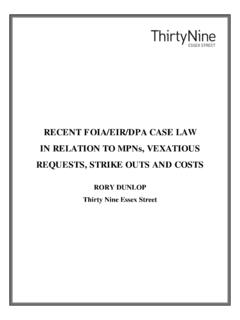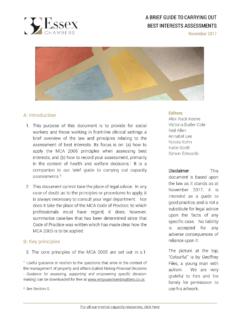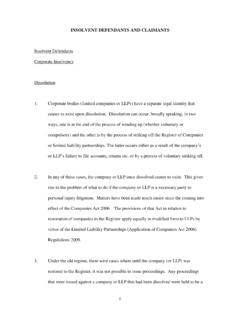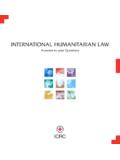Transcription of International Arbitration The Key Elements
1 International Arbitration The Key Elements A presentation by CHARLES MANZONI at 39 Essex Street Wednesday 5th May 2004 What is International Arbitration A 2 The Consequences of being 4 The agreement to arbitrate .. 7 The Importance of the Seat of the Arbitration .. 8 Ad Hoc or Institutional Arbitrations .. 16 International Conventions and the Model 18 The Geneva Protocol 18 The Geneva Convention 1927 .. 19 The New York Convention .. 19 The Model 20 2 What is International Arbitration A Definition 1. Lots of people blithely speak of International Arbitration , without defining what it is. If an arbitrator is American, lives in America but is an arbitrator with particular specialisation, and he is asked to conduct, an Arbitration in London between two UK parties concerning a contract carried out in London, is that International ? Does the fact that one set of lawyers is from Australia and one from the United States make it an International Arbitration when the dispute is about UK contract, between UK parties, or possibly even UK subsidiaries of foreign parties, and the contract was carried out in the UK?
2 In some people s terminology, the answer is often Yes to such questions. The reality though should be considered to be a little more carefully. 2. A national, or domestic Arbitration is one that is concerned purely with national, or domestic matters. It does not matter whether the relevant nation is Thailand, or England, or Hong Kong, or Germany. If everything concerned with the Arbitration is related to that jurisdiction, then the Arbitration is a domestic Arbitration . In order properly to answer the question, one needs to look at two aspects: (i) The nature of the dispute in question. The widest adoption of this test is within the International Chamber of Commerce Court of Arbitration in Paris ( ICC ). They do not give any definition of an International Arbitration , but do give the following guidance: the International nature of the Arbitration does not mean that the parties must necessarily be of different nationalities.
3 By virtue of its object the contract can nevertheless extend beyond national borders, when for example a contract is concluded between two nationals of 3the same state for performance in another country or when it is concluded between a state and a subsidiary of a foreign company doing business in that state. This is definitely a wide interpretation, and would include a subsidiary of a foreign company arbitrating against a state even when that subsidiary is incorporated in the state against whom it is arbitrating (although apparently not two subsidiaries of foreign companies arbitrating against each other about a contract to be carried out in the same state). (ii) The alternative approach is to look at the nationality of the parties. For example the European Convention on International Arbitration (1967) applies to agreements which are: Arbitration Agreements concluded for the purpose of settling disputes arising from International trade between physical or legal persons having, when concluding their agreement, their habitual place of residence or their seat in different contracting states.
4 Switzerland and the US adopt similar approaches. 3. The UNCITRAL Model Law was specifically designed to apply to International Arbitration , and as a result necessarily required a definition of International Arbitration . It combines both approaches set out above: An Arbitration is International if: (a) the parties to an Arbitration agreement have, at the time of conclusion of that agreement, their places of business in different states; or 4 (b) one of the following is situated outside the State in which the parties have their place of business: (i) the place of Arbitration , if determined in, or pursuant to, the Arbitration agreement; (ii) any place where a substantial part of the obligations of the commercial relationship is to be performed or the place with which the subject matter of the dispute is most closely connected; or (c) the parties have expressly agreed that the subject matter of the Arbitration agreement relates to more than one country.
5 The Consequences of being International 4. But so what, you might say. Who cares whether one person calls it International and another person doesn t? For the purposes of self esteem, or writing your CV, of course it makes no difference if people have a chance, they will call it International in such documents, but the point remains significant when asking the courts of a relevant jurisdiction to intervene in the arbitral process, either for enforcement purposes or otherwise. Many jurisdictions have a different set of rules for International arbitrations to that for domestic arbitrations. France, Switzerland, Belgium, the UK (until 1996), Columbia and Hong Kong are examples of states with different rules for each type of arbitrations. Under the 1996 Act however, the distinction was generally removed and there is now only one law for Arbitration in the , whether domestic or International .
6 However, the distinction remains significant, even in the because recourse against an award, and recognition and enforcement of an International award 5remains to be governed by the Convention obligations of the UK (and specifically by the New York Convention) rather than by domestic law1. 5. For example, in Hong Kong: The definition of an International Arbitration is as set out in the Model Law. Parts 1 and 1A of the Arbitration Ordinance apply to both International and domestic Arbitration Part II only applies to a domestic Arbitration Part II A applies only to International Arbitration , and introduces the Model Law to such arbitrations, subject to installing the Court of First Instance and HKIAC as the main administrative body. What constitutes the commencement of a domestic and an International Arbitration is different (Domestic service of notice to concur2; International date a request to refer to Arbitration is received3) Hong Kong is slightly more complex than normal, because in addition, it recognises the concept of a Mainland Award , which is an award made on the Mainland of China, and recognised by a competent Mainland Authority in accordance with the Arbitration law of the PRC.
7 6. It should also be noted that the parties can agree (under the model law or under other domestic legislation) whether an Arbitration should be treated as being 1 Compare Section 66 and 99 103 of the 1996 Act 2 Section 31 of Ordinance 3 Model Law article 21 6international or domestic. However, simple adoption of rules headed International or Domestic will not be sufficient to effect such an agreement4. 7. Perhaps the most significant issue arising out of this question is recourse against the award and enforcement of it. The New York Convention (being the primary instrument for enforcement) and other International conventions provide for the enforcement of awards that are foreign or International awards. These are defined as being awards made in the territory of a State other than the State where the recognition and enforcement of such awards are sought , and that definition is then expanded to include only awards that are not considered to be domestic awards.
8 Thus, if there is an award that the relevant law considers to be domestic, it may well be very difficult to enforce it in any country other than the domestic tribunals. 8. In addition, there is the difficult question of what laws might apply. There are several different national legal systems or rules of law that might have a bearing on an International Arbitration : (i) the law that governs the capacity of the parties to enter into an Arbitration agreement. For parties from two states, this could be two different laws; (ii) the law that governs the agreement to arbitrate. This need not be the same as either law governing capacity. This law will govern the recognition and enforcement of the agreement to arbitrate. Note that in order to be effective, an agreement to arbitrate needs to be capable of enforcement. Thus the Geneva Protocol of 1923 provides that the courts of the contracting states will stay proceedings of any matter if there is a valid Arbitration agreement.
9 For example, Japanese law makes an Arbitration agreement in relation to matrimonial matters unenforceable. Some countries make foreign exchange disputes non-arbitrabal. 4 Sol International Ltd v Guangzhou Dong-Jun Real Estate Investment Co Ltd [1988] 3 HKC 493. 7 (ii) the law that governs (or regulates) the actual Arbitration proceedings themselves (usually the law of the seat of the Arbitration perhaps different to the place where the Arbitration takes place but normally the same). This is sometimes called the Curial Law or Lex Arbitri . (iii) the law that the arbitrators must apply to the substantive issues within the Arbitration itself ( the law that governs the contract. Could be a national law, or International law, or transnational law) (iv) the law that governs recognition and enforcement of the award made by the tribunal (generally the law of the country in which the award was made but could be the law under which it was made, which may be different).
10 9. Having looked at whether an Arbitration is International or not, and recognised that different legal systems can apply to different parts of the process, one can then move on to look at the key concepts that make up International Arbitration . The agreement to arbitrate 10. This is an essential element in all arbitrations as it is the cornerstone of the jurisdiction of the tribunal. Without an agreement, there can be no valid Arbitration . The national laws and International treaties governing International Arbitration recognise this, and an award will not be enforceable if the agreement to arbitrate is invalid in some way ( if the parties were under some incapacity or if the agreement were invalid under its own governing law5. Note that potentially three legal systems could be relevant to this question). 11. It is also necessary, for all practical purposes, to have a written Arbitration agreement.














